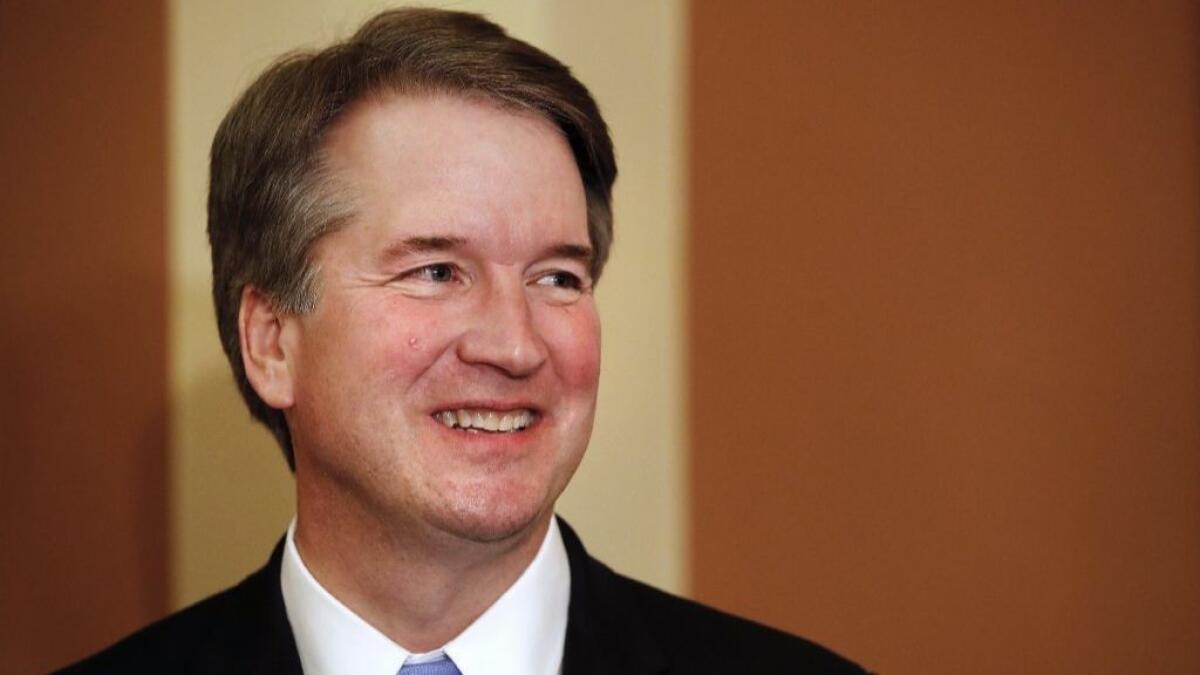Editorial: The Senate needs to see more of Judge Kavanaugh’s records

- Share via
Democrats are complaining that Republicans who control the U.S. Senate are in a rush to confirm Brett Kavanaugh for a seat on the Supreme Court without an adequate airing of his record. Republicans respond that Democrats are demanding documents from Kavanaugh’s days in the George W. Bush administration in order to derail a nominee they consider eminently well qualified who would move the court to the right.
They’re both right.
Sen. Charles E. Grassley (R-Iowa), the chairman of the Senate Judiciary Committee, scheduled Kavanaugh’s confirmation hearings to start Sept. 4, potentially putting him on the court before the committee has acquired even the information Republicans acknowledge they need to fairly evaluate him.
At the same time, it’s unlikely that many of the Democrats who are demanding to see papers from Kavanaugh’s service as Bush’s staff secretary more than a decade ago are open-minded and looking for information to enable them to make a decision; rather, they’re hoping to find a smoking gun that will doom a nomination they never were going to support.
Yet the possibility that the Democrats have an ulterior motive doesn’t alter the fact that they are right to insist that the Senate — and the public — be given the fullest possible picture of Kavanaugh’s legal views and character before he is confirmed to a lifetime appointment.
The committee should insist on seeing any documents with a bearing on Kavanaugh’s credentials.
It’s true, as Republicans argue, that the most important window on how Kavanaugh would perform on the Supreme Court is provided by the hundreds of opinions he has written in 12 years on the U.S. Court of Appeals for the District of Columbia Circuit. But that doesn’t mean the Senate shouldn’t see relevant documents from the nonjudicial positions he has occupied.
Here’s why: Appeals court judges such as Kavanaugh are bound by precedents of the Supreme Court. But Supreme Court justices are free to overturn those precedents and apply their own views of the Constitution. Positions Kavanaugh took as a lawyer and staff member in the Bush administration could shed light on how he might rule when unconstrained by a higher authority.
Grassley requested that the George W. Bush Presidential Library, part of the National Archives and Records Administration, provide records from Kavanaugh’s service in the White House counsel’s office (along with documents relating to his nomination as an appeals court judge). But he didn’t ask for paperwork Kavanaugh handled as Bush’s staff secretary, as Democrats have urged.
Grassley has scoffed that those documents are “the least probative of Judge Kavanaugh’s legal thinking and the most sensitive to the executive branch.” Other Republicans have argued that as staff secretary Kavanaugh’s role was simply that of a “traffic cop.” Yet Kavanaugh himself, when asked what prior experiences helped prepare him to be a judge, said his time as staff secretary had been “the most interesting and formative for me.”
Enter the Fray: First takes on the news of the minute from L.A. Times Opinion »
It ought to be possible to distinguish documents that Kavanaugh merely forwarded to the president from those he wrote or commented on. And Democrats have offered to narrow the scope of the document hunt by supplying the archives with search terms that would exclude material not relevant to Kavanaugh’s views.
Finally, in seeking additional documents from Kavanaugh’s White House service, Democrats aren’t interested only in gleaning his legal opinions. They also contend that Kavanaugh might have misled the Judiciary Committee in his 2006 confirmation hearings for the appeals court when he testified that he was unaware of Bush administration policies on warrantless wiretapping and the detention and torture of enemy combatants. These inquiries may be politically motivated, but producing the documents Democrats are seeking could settle the issue.
Unfortunately, unless the Republicans have a change of heart, Kavanaugh’s record might not be fully ventilated before he goes before the Senate. The National Archives has warned that it might not be able to review all of the material until late October, weeks after Kavanaugh’s hearings are due to end. Committee Republicans hope to receive copies of the documents more quickly from a separate team headed by William Burck, a lawyer who served as Kavanaugh’s deputy in the Bush White House. But Democrats have questioned that arrangement, arguing that Burck’s ties to Kavanaugh and figures close to President Trump could lead him to hold back documents harmful to the nominee.
Grassley might not want to make concessions to Democratic senators who are likely to vote against Kavanaugh regardless of what documents are produced. But it’s also in the nominee’s interest for the confirmation process to be thorough, transparent and credible. The committee should insist on seeing any documents with a bearing on Kavanaugh’s credentials. If obtaining them requires that the hearings be delayed, so be it.
Follow the Opinion section on Twitter @latimesopinion and Facebook
More to Read
A cure for the common opinion
Get thought-provoking perspectives with our weekly newsletter.
You may occasionally receive promotional content from the Los Angeles Times.









